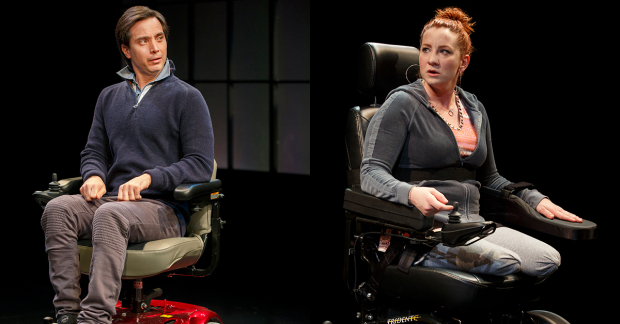Interview: Gregg Mozgala and Katy Sullivan Take Cost of Living to Broadway
The two actors discuss their long journeys with Martyna Majok’s Pulitzer-winning drama.
The journey of Martyna Majok's Cost of Living is one of the more beautiful Pulitzer Prize-winning plays of recent memory. This delicate four-character play is about two different and seemingly mismatched couplings: John, an arrogant Ph.D. with cerebral palsy and his recently hired aide Jess, who has fallen on hard times; and Eddie, an unemployed trucker who returns to his estranged ex-wife Ani after an accident leaves her paralyzed.
But the Pulitzer committee puts it best. It's "an honest, original work that invites audiences to examine diverse perceptions of privilege and human connection." Actor Gregg Mozgala was involved back in 2015 when Majok presented him with the first three scenes as a short play for Ensemble Studio Theatre titled John, Who's Here From Cambridge. He, alongside actor Katy Sullivan, were eventually cast in the full-length version, titled Cost of Living for runs at Williamstown Theatre Festival and off-Broadway via Manhattan Theatre Club. Sullivan, who's also a record-setting athlete (she was among the first bilateral above-knee amputees to complete in the Paralympics in ambulatory track), even starred in Cost of Living to London's Hampstead Theatre.
Now, years after their journeys with this play began, Mozgala and Sullivan are leading Cost of Living to Broadway, a well-deserved home for this terrific piece of theater. Here, they tell us about the importance of this event.

(© Tricia Baron)
This conversation has been condensed and edited for clarity.
Gregg, you've been working on this the longest. Can you talk a little bit about when you first received the original short play version, and what it has been like to build the character through the years?
Gregg Mozgala: That one happened at the Ensemble Studio Theatre around 2015, and the title was John, Who's Here From Cambridge. Martyna and I actually met three years prior through a mutual friend in Chicago, and she was then part of Youngblood, the writer's group at EST, which I had been a part of. So when Martyna was like, "I've got this play, and there's a character with cerebral palsy," the co-artistic directors were like "Oh, we know this actor with CP, Gregg," and she's like "I know Gregg!"
It just worked out. It was this crazy cosmic thing, which is similar to what the play does. And I have never…Even though there are characters with disabilities all throughout the canon, I have rarely ever seen a character with cerebral palsy that was written with such care and complexity. It really was a thrill to experience that on the first read. That play is the first three scenes [of Cost of Living]. Very little has changed since then, textually. And it was, and it continues to be, a real gift.
Katy, what was it like for you when you came in for the first run, at Williamstown?
Katy Sullivan: I was immediately scared of it. Her vulnerability. With not only her relationship, but physically what she's been through. All of that terrified me. So I was like "Well, I guess this is something I should try to do." As an artist, if something scares the crap out of you, maybe it's worth trying to do. But I find the play to be incredibly beautiful, and I appreciate that other people feel the same way. Because it does dive into the human experience, and the fact that we all need something from someone else doesn't matter what your circumstances are. But yeah, my first experience with this play was just terror, so the evolution has been really nice.
Gregg: There's something similar for me, obviously because of the reality of John's physical life, but also the vulnerability and the exposure. The literal exposure: John gets showered and is naked on stage, which is something I had never done before. But you're seeing a human body at its most vulnerable, and it needs care, and it needs support, and I felt a connection to that. As Katy said, one of the major themes in the play is the need for care for human beings in general. Needing companionship, needing to be near somebody else.
Katy: I think it's so interesting to approach this play after what we've all globally been through. I think the themes are gonna be so poignant for people.
Gregg: That speaks to the power of the play. It was so powerful when we first did it. These themes are very human: the struggle for daily existence.

(© Joan Marcus)
You've had two different actors opposite you during each run of the play. Can you talk about working with Kara Young and David Zayas, and how they help deepen your performances?
Katy: David brings this marvelous heart and vulnerability to the character. He himself is kind of like Eddie: he means well in every moment. Eddie constantly makes mistakes, but when it comes from this sweet core, it's almost more heartbreaking with David, because you're just like "Oh, come on, man!"
Gregg: I've known Kara for a number of years, through the New York theater scene. We've done small-scale things here and there, and she's just always…How do I say it? Even in those instances, she's challenged me to up my game. What a joy it is to have someone who is so open, and I'm bringing all that I have to match her. What feels different to me about this time is having a little distance around it, and having had more opportunities to work and act in the interim. I feel a little more confident in the character, and in my own abilities, too, and that comes with maturity.
What does it mean to do this play on Broadway? Because Williamstown is one thing, and City Center is one thing, but Broadway is the whole shebang.
Katy: I wish I could go back in time and tell 17-year-old Katy Sullivan that this was going to happen. There weren't disabled actors on Broadway when I was 17 years old, so the thought that I could ever end up here was the longest of long shots. It's so exciting to be part of what feels like a movement of artists and work and stories being told from an authentic perspective. That people are no longer going "We'll just take a known actor and put 'em in a wheelchair and call it a day." I think that's what makes this show have such a profound impact, that you're seeing bodies that you don't normally see on stage, played by people that have those bodies.
Gregg: I agree a thousand percent with what Katy said. Fourteen-year-old me…And even, I think this may be the first original play on Broadway — there have been revivals in recent history that have cast disabled people, mainly by one Broadway director, Sam Gold, who has disability within his own life.
Katy: But I don't think there has been an original play with a character written to be physically disabled, although there are shows like Children of a Lesser God. It's that whole idea of if you can see it, you can be it. We were lunatics, because we were like "I don't see it, but I'm gonna be it anyway."
Do you look at yourselves as Broadway trailblazers in that respect?
Katy: That's a lot to carry.
Gregg: I just want to show up at every day and be ready to go. But by the very nature of this having never been done before….And you know what's great too? The script is published and our names are in the book, and there's gonna be some 14-year-old kid somewhere in America that reads this and goes "What? I can play this part? And if I could play this part, what else is there?" To be at the tip of the spear is a lot, you know? So right now I'm focusing on being an actor and whatever comes, comes.
Katy: Yeah. I mean, at the end of the day, you try and do it to the best of your ability. One play is not going to change the world. But this play on Broadway is gonna change some things.








